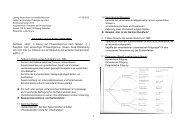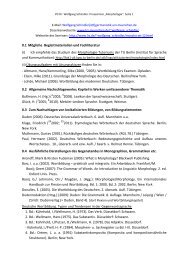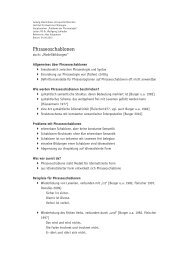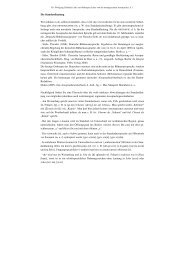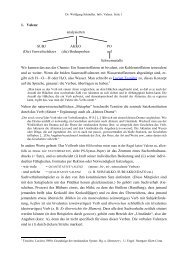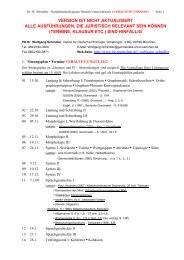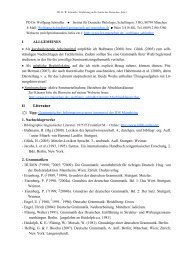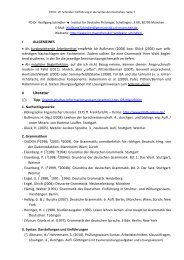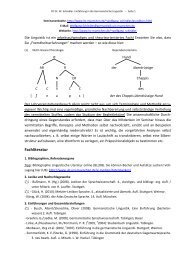Chapter 18 Lexical Functions: Description of Lexical Relations in a ...
Chapter 18 Lexical Functions: Description of Lexical Relations in a ...
Chapter 18 Lexical Functions: Description of Lexical Relations in a ...
Create successful ePaper yourself
Turn your PDF publications into a flip-book with our unique Google optimized e-Paper software.
—<strong>Chapter</strong> <strong>18</strong>. <strong>Lexical</strong> <strong>Functions</strong>— 94<br />
The <strong>in</strong>ventory <strong>of</strong> LFs is established empirically, and no logical reason<strong>in</strong>g can guarantee the non-<br />
existence <strong>of</strong> other LFs.<br />
First, a language that has not yet been explored for restricted lexical coccurrence could<br />
have an LF which is not known today, someth<strong>in</strong>g, say, like (<strong>of</strong> a big size) or (deal with Y <strong>in</strong> a<br />
friendly/unfriendly manner). True, the probability <strong>of</strong> f<strong>in</strong>d<strong>in</strong>g such a function cannot be very high,<br />
because the most abstract and general mean<strong>in</strong>gs appear<strong>in</strong>g as LFs are already, so to speak,<br />
<strong>in</strong>volved and an LF by def<strong>in</strong>ition tends to be associated with a very abstract and general mean<strong>in</strong>g.<br />
Second, the borderl<strong>in</strong>e between standard and non-standard LFs is strictly quantitative,<br />
which means that it is rather fuzzy: the researcher has to decide whether a given LF should be<br />
treated as a standard or non-standard one, and <strong>in</strong> many cases the decision is far from obvious.<br />
Thus, consider three candidates for Simple Standard LFs: (female <strong>of</strong>) = Fem, (male <strong>of</strong>) = Masc, and<br />
(young <strong>of</strong>) = Juven. All the three are def<strong>in</strong>ed for all animal names:<br />
Fem(horse) = mare Masc(horse) = stallion Juven(horse) = foal<br />
Fem(chicken) = hen Masc(chicken) = rooster Juven(chicken) = chick<br />
Fem(cat) = (pussy)cat Masc(cat) = (tom)cat Juven(cat) = kitten<br />
Fem(goose) = goose Masc(goose) = gander Juven(goose) = gosl<strong>in</strong>g<br />
Fem(elephant) = elephant cow, Masc(elephant) = elephant bull, Juven(elephant) = baby<br />
cow elephant bull elephant elephant<br />
Fem(tiger) = tigress Masc(tiger) = tiger Juven(tiger) = tiger<br />
cub<br />
Do they qualify? I th<strong>in</strong>k that <strong>in</strong> English rather not: their keywords are limited <strong>in</strong> number<br />
and very specific: just animal names. In addition, they do not participate <strong>in</strong> paraphras<strong>in</strong>g. (But I<br />
by no means <strong>in</strong>sist on this op<strong>in</strong>ion.) However, noth<strong>in</strong>g precludes us from discover<strong>in</strong>g a language<br />
where these LFs will embrace also human be<strong>in</strong>gs, <strong>in</strong>clud<strong>in</strong>g names <strong>of</strong> <strong>in</strong>habitants; <strong>in</strong> such a<br />
language it would be more justified to consider Fem, Masc and Juven as standard LFs.<br />
For the same reason, I do not th<strong>in</strong>k that it is worth <strong>in</strong>troduc<strong>in</strong>g as a Standard LF the LF<br />
Pecun = (currency <strong>of</strong>): USA ~ dollar, Germany ~ mark, Ukra<strong>in</strong>e ~ karbovanec, Norway ~ crown,<br />
Greece ~ drachma, Japan ~ yen, Israel ~ shekel, Paraguay ~ guaraní, Samoa ~ tala, ...: the set <strong>of</strong><br />
possible keywords is closed and they are highly specific (names <strong>of</strong> countries). In addition, the LF<br />
Pecun is too sensitive to ‘external’ change: thus, the advent <strong>of</strong> the euro wiped out many <strong>of</strong> its<br />
possible values. And, most importantly, Pecun aga<strong>in</strong> cannot participate <strong>in</strong> paraphras<strong>in</strong>g.


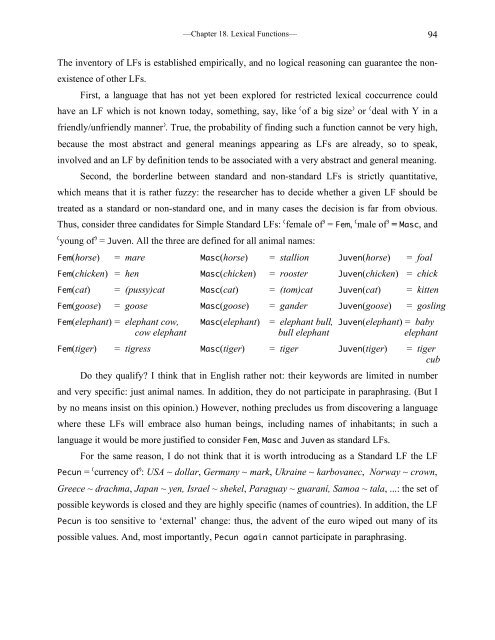
![E-Mail: Wolfgang.Schindler[ätt]germanistik.uni-muenchen.de Web ...](https://img.yumpu.com/51590147/1/184x260/e-mail-wolfgangschindlerattgermanistikuni-muenchende-web-.jpg?quality=85)
